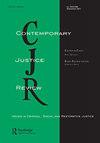Restorative justice: a qualitative analysis of school security perspectives
Q2 Social Sciences
引用次数: 3
Abstract
ABSTRACT Grounded in Restorative Justice theory, the current study examines the perspectives of School Resource Officers (SROs) and other School Security Personnel (SSPs) during a professional development training on restorative-problem solving. Specifically, focusing on how school security staff are currently using restorative justice in their work, how they can use these practices in the future, and any variations in perspectives towards restorative justice based on their job title. A qualitative phenomenological methodology was used to analyze qualitative responses to training logs from SROs and SSPs (n = 99). Throughout the module, participants were asked to reflect on five different situations and provide examples of how they would address these issues using restorative justice. Codes and memos were used to summarize the themes across participants. Both SROs and SSPs are aware of restorative practices and use them to some capacity in their roles. However, additional training is needed to ensure that practices are used consistently and effectively across positions and schools. To abolish the U.S. school-to-prison pipeline, all school staff including security should receive mandatory, ongoing, evidence-based professional development for school-wide implementation of restorative justice as an alternative to punitive disciplinary strategies that disproportionately harm students of color and their families.恢复性司法:学校安全视角的定性分析
摘要基于恢复性司法理论,本研究考察了学校资源官(SRO)和其他学校安保人员(SSP)在恢复性问题解决专业发展培训中的观点。具体而言,重点关注学校安保人员目前如何在工作中使用恢复性司法,他们未来如何使用这些做法,以及根据他们的职称对恢复性司法的看法的任何变化。使用定性现象学方法分析SRO和SSP(n=99)对训练日志的定性反应。在整个单元中,参与者被要求反思五种不同的情况,并举例说明他们将如何利用恢复性司法解决这些问题。代码和备忘录用于总结参与者的主题。自律组织和SSP都知道恢复性做法,并在一定程度上发挥其作用。然而,还需要额外的培训,以确保在各个职位和学校中一致有效地使用这些做法。为了废除美国从学校到监狱的管道,包括安保人员在内的所有学校工作人员都应该接受强制性的、持续的、基于证据的专业发展,以便在学校范围内实施恢复性司法,作为对有色人种学生及其家庭造成不成比例伤害的惩罚性纪律策略的替代方案。
本文章由计算机程序翻译,如有差异,请以英文原文为准。
求助全文
约1分钟内获得全文
求助全文

 求助内容:
求助内容: 应助结果提醒方式:
应助结果提醒方式:


